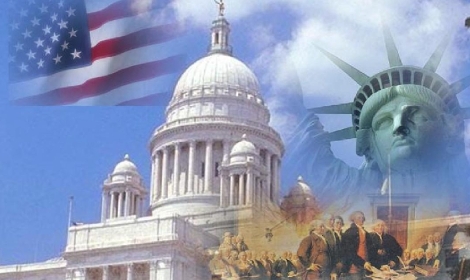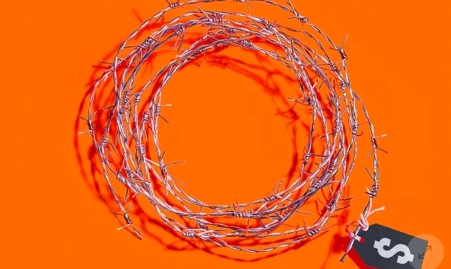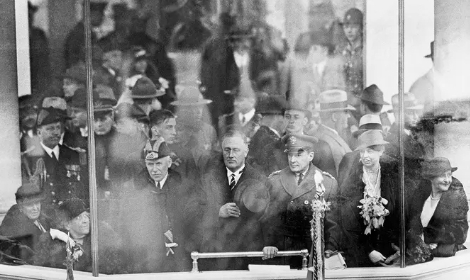美国政治的根本问题是什么?(一)
正文翻译

What is the root problem in US politics?
美国政治的根本问题是什么?

What is the root problem in US politics?
美国政治的根本问题是什么?
评论翻译
Steven Haddock
I’ve spoken about the Senate before, but I’m going to drop that line.
Instead, let’s talk about another systemic problem - the size of Congress.
The first U.S. House of Representatives took office in 1789. There were 59 of them representing a population of just under 4 million. Six more were seated before the next election in 1791. That’s one representative for roughly every 68,000 Americans.
Today, there are 435 members in the House representing over 300 million people. That’s one for every 690,000 Americans. That’s been the trend since the House “filled up” and instead of increasing the number of representatives they just gave them more constituents. The U.S. population has roughly tripled since the number of members was fixed at 435.
Compare this with the UK which has 650 Members of Parliament for a country with a population of 67 million - so that’s about one MP for every 100,000 people or so.
The teeny tiny size of the House compared to the population leads to the problem that the House is unrepresentative of the population as a whole - it tends to be whiter, richer, older and more male. In addition, it’s difficult to serve a constituency that large.
It also skews representation towards the small states. Wyoming gets “One” with a population of 580,000. If the whole House had districts that size, it would have 531 members. It’s also one of the reasons gerrymandering is so effective and so easy.
You could do the same with the Senate and maintain its character. Why only two senators per state? Why not three)? Or six ?
The other nice thing about small constituencies is that it makes it much, much cheaper to run. Canadian “ridings” also have about 100,000 people and rarely is more than $200,000 spent by all the parties in a race. Larger constituencies, which are “winner take all”, are more susceptible to big spending, but that’s harder with a lot of little races.
我以前谈到过参议院,但我打算放弃这一点。
相反,让我们谈谈另一个系统性问题——国会的规模。
第一届美国众议院于1789年就职。其中59个代表着将近400万的人口。在1791年的下一次选举之前,又有六人当选,这相当于大约每68000名美国人中就有一名代表。
今天,众议院有435名议员,代表着3亿多人口,这相当于每69万美国人出一名代表。这是自众议院“爆满”以来的趋势,他们没有增加代表人数,只是让他们代表了更多的选民。自国会议员人数固定在435人以来,美国人口大约增加了两倍。
与之相比,英国有650名议员,人口规模为6700万,大约每10万人中就有一名议员。
与人口相比,众议院的规模微不足道,这导致了众议院不能代表整个人口的问题——它往往是白人、富人、老年人和更多男性。此外,也很难为这么大的选区服务。
它还使代表权向小州倾斜。怀俄明以58万人口获得“1”名代表。如果整个众议院都参照此比例的话,那么将有531名议员。这也是不公正划分选区如此有效和容易的原因之一。
你可以对参议院采取同样的做法,并保持其性质。为什么每个州只有两名参议员?为什么不选三人或者选六人?
小选区的另一个好处是,它使竞选成本大大降低。加拿大的“骑马运动”也有大约10万人,在一场比赛中,各方的花费很少超过20万美元。更大的选区是“赢者通吃”,更容易受到大额支出的影响,但在很多小竞选中,就更难搞鬼了。
Matthew Bates
I’d go with a lack of unifying cultural norms, morals, or expectations from individuals and governments, as well as a lack of any real external threat that may unite such a diverse group of people.
Cultural diversity is great for a lot of things, but it’s not very conducive to “getting things done” if “getting things done” requires agreements among the masses about things that have a moral aspect to them.
Gun control is a good example of this. For some American subcultures, gun ownership is a rite of passage. It’s a past time. It’s a way of life. It’s a symbol of freedom. For some, the threat of a slippery slope towards government oppression beginning with even small gun control measures doesn’t sound crazy. For some, restricting the rights of law-abiding citizens to own any gun they want is immoral.
But, for other American subcultures, guns are evil. They are tools that are only used to commit crimes or kill people. They think that the Founding Fathers could not have possibly understood what innovations there would be in guns in the future. They see no problem with what they term “sensible gun laws.” They don’t worry about a slippery slope into government oppression. Gun ownership isn’t a rite of passage for them.
我认为缺乏统一的文化规范、道德或个人和政府的期望,也缺乏任何真正的外部威胁来团结这样一个多元化的群体。
文化多样性对很多事情都有好处,但如果“把事情做好”需要大众对道德方面的事情达成一致,那么文化多样性就不利于“把事情做好”。
对一些美国亚文化群体来说,拥有枪支是一种成人仪式。那是过去的事了,这是一种生活方式。这是自由的象征。对一些人来说,从很小的枪支管制开始,反对“政府压迫”的滑坡就开始存在了,这听起来并不疯狂。对一些人来说,限制守法公民拥有他们想要的任何枪支的权利是不道德的。
但是,对于其他美国亚文化来说,枪支是邪恶的。它们只是用来犯罪或杀人的工具。他们认为开国元勋们不可能理解“未来枪支会有哪些创新”。他们认为他们所谓的“合理的枪支法”没有问题。他们从不担心反对“政府压迫”的滑坡。对他们来说,拥有枪支对他们来说并不是一种仪式。
Until one of those American subcultures becomes the dominant culture, nothing is going to get done when it comes to gun control.
You really have to look at the U.S. more like the E.U. now: an association of different cultures that can agree on some things for their mutual benefit, but where respect for subcultural norms and local laws and customs is paramount.
Abortion and animal rights are good issues to see the different subcultural morals in the United States. There are strict laws in place for protecting animals from abuse and suffering… even animals whose sole purpose in life is to be slaughtered and fed to humans… while some American subcultures push back against any attempt to restrict abortions, although the unborn can feel suffering, too. Both of these issues rely on some sort of shared morality among the masses to be “settled,” and there is no shared morality across the whole or even the majority of the American populace. So these issues… particularly the abortion issue… will never be “settled,” until there isn’t as much moral diversity in the United States.
When was the government less divided and more able to “get things done?” When there was one dominant subculture among the populace, at the same time there was an existential threat to the country. A diverse populace + safety from any existential threat = political gridlock.
除非其中一种美国亚文化成为主导文化,否则在枪支管制方面什么都做不了。
你现在真的应该把美国看得更像欧盟:一个不同文化的协会,可以在一些事情上达成共识,以实现共同利益,但尊重亚文化规范和当地法律和习俗是至关重要的。
堕胎和动物权利是很好的问题,可以看到美国不同的亚文化道德。有严格的法律保护动物(甚至是那些生命中唯一目的是被屠杀和喂养给人类的动物)免受虐待和痛苦;而一些美国亚文化反对任何限制堕胎的企图,尽管未出生的人也会感到痛苦。这两个问题都依赖于大众之间某种共同的道德来“解决”,而在整个美国民众中,甚至在大多数美国民众中,都没有共同的道德。所以这些问题,尤其是堕胎问题,永远不会“解决”,直到美国没有那么多道德多样性。
什么时候政府的分歧更小,更能“把事情办好”?当民众中有一种占主导地位的亚文化时,同时国家也面临生存威胁。多样化的民众+免受任何生存威胁的安全=政治僵局。
Sawyer Smith
In front of the Willard Hotel in Washington, D.C. there are two statues; one donkey and one elephant.
The donkey represents our Democratic party and the elephant represents our Republican party. Both are weird choices for mascots, but thats America for you.
Anyway, you will always see groups taking pictures with them and its always interesting to see where a family, or school group, or couple, or whoever chooses to stand in regards to the statues and thats our problem.
Consciously or subconsciously the people are choosing which one of the two statues they want to stand closer to and its weird how much angst that causes.
Theres so much division in that moment and, “oh, so you’re on that side?” going on and it stings. It hurts us all and sets us back as a country.
With that in mind, I’d say that the root problem in American politics is that a system where there is only two major parties divides us more than it unites us.
How do we change that? How do we actually achieve bipartisanship and not just say that we are? How do we un-polarize ourselves?
To be honest, I have no idea, but its in all of our best interest to try. Thanks for reading and have a nice day everyone.
在华盛顿特区的威拉德酒店前面有两座雕像:一头驴和一头大象。
驴代表我们的民主党,大象代表我们的共和党。这两种吉祥物都是很奇怪的选择,但对你来说,这就是美国。
不管怎样,你总是会看到一群人和他们合影,看看一个家庭、学校团体、夫妇,或者任何选择站在雕像前的人,这总是很有趣的,这就是我们的问题。
人们有意识或潜意识地选择他们想要站得更近的两个雕像中的哪一个,这引起了多么奇怪的焦虑。
在那一刻有很多分歧,“哦,所以你在那边?”这句话很伤人。它伤害了我们所有人,使我们作为一个国家倒退。
考虑到这一点,我想说,美国政治的根本问题是,一个只有两个主要政党的制度将我们分开,而不是将我们团结在一起。
我们如何改变这一点?我们如何真正实现两党合作,而不仅仅是说说而已?我们如何消除自己的两极化?
老实说,我也不知道,但试一试对我们所有人都有好处。谢谢你的阅读,祝大家有美好的一天。
Emma
The Two-Party System.
With a population of 328 million and steadily increasing,[1] the US has plenty of room for diversity, new ideas, and a wide range of opinions.
In 2017, there were about 44.4 million immigrants living here. The population is made up of millions of white people, black people, Asians, Latinos, and Hispanics—as well as around 2 million Native Americans.
There are people of many different religions—such as Protestant Christianity, Catholicism, Judaism, Mormonism, Islam, etc, as well as people who don’t worship a religion.[2]
The demographics of the US are obviously very diverse.
However, despite this utter diversity, when the election comes, we only get two choices.
Or, two choices that have a chance on election day—many people that would vote third party don’t end up doing so because they know that there’s no way that their choice of candidate would end up on top.
两党制。
美国有3.28亿人口,而且人口还在稳步增长,美国有足够的空间容纳多样性、新思想和广泛的观点。
2017年,大约有4440万移民居住在这里。人口由无数白人、黑人、亚洲人、拉丁美洲人和西班牙人组成,还有大约200万印第安人。
这里有信仰不同宗教的人,比如基督教新教、天主教、犹太教、摩门教、伊斯兰教等,也有不信仰任何宗教的人
美国的人口结构显然非常多样化。
然而,尽管存在这种完全的多样性,当选举到来时,我们只有两种选择。
或者说在选举日,只提供两个选择——许多本来会投票给第三党的人最终没有这样做,因为他们知道他们选择的候选人不可能最终获胜。
Regardless of upbringings, religions, races, incomes—our views are split into two boxes.
It’s rare to agree with absolutely everything that one box has in it, but regardless, you have to pick.
Election Day comes, and you have to think to yourself, “I may absolutely despise both candidates. But which candidate to I despise a little bit less?”
Then you write somebody’s name down that you don’t like to have the greatest amount of power in your country for four years.
Such a high position is chosen by making a choice between the lesser of two evils.
And the one with the highest number of votes might not even end up winning—don’t even get me started on the electoral college.
无论成长背景、宗教、种族、收入如何,我们的观点都分为两个框架。
很少有人完全赞同一个框架里的所有东西,但无论如何,你必须做出选择。
选举日到了,你必须想,“我可能完全鄙视两位候选人。但是哪位候选人我更不鄙视呢?”
然后你写下一个你不喜欢的人的名字让他在四年里在你的国家拥有最大的权力。
如此高的职位是依靠“两害相权取其轻”来做出选择。
而拥有最高票数的那个人甚至可能最终都不会获胜——别让我提选举团的事了。
Michelle - MAD PIRATE QUEEN
This might sound a little weird, but … I firmly believe that US politics has a loyalty problem. People are too loyal which is leading to a partisan riddled nightmare where people continue to support awful representatives (who don’t do or achieve anything for anyone) just because they’re a member of a certain political party.
The fight has become Right versus Left and not ‘Which party/candidate/representative can do the best job and deliver the best outcomes for me or for all Americans?’.
Imagine you were hiring tradesperson to build a new garden in your yard. You get some quotes from different options, and then you choose the best option that you believe can do the best job at the best price. Now imagine that the tradesman you chose wasn’t prepared, didn't invest the money you gave them in needed materials, didn’t have plan and achieved nothing and you're left with no garden…
What if you needed a garden built but instead of promising to build one, all they promised was that they’d stop any other tradesman from building you a garden because (in the tradesmen’s opinion) thegarden they’d build would be crappy?
这听起来可能有点奇怪,但我坚信美国政治存在忠诚度问题。人们过于忠诚,这导致一场党派林立的噩梦,人们仅仅因为他们是某个政党的成员就继续支持糟糕的代表(他们不会为任何人做任何事情或取得任何成就)。
这场斗争已经变成了右翼对左翼,而不是“哪个政党/候选人/代表能做得最好,能为我或所有美国人带来最好的结果?”。
想象一下,你正在雇一个工匠在你的院子里建一个新的花园。你从不同的选项中得到一些报价,然后你选择了你认为可以以最佳价格完成最佳工作的最佳选项。现在想象一下,你选择的工匠没有做好准备,没有把你给他们的钱投资于所需的材料,没有计划,一无所获,你没有花园。
如果你需要建造一个花园,但他们没有给予承诺,而是承诺阻止任何其他工匠为你建造花园。因为在工匠看来,那些人建造的花园会很糟糕?
They aren’t building anything… all they’re doing is stopping someone else from doing something but it's YOU that’s paying them to stop others from building you a garden and somehow they’ve convinced you that this is a good thing for you.
You still don't have a garden.
Would you hire them again next time?! Would you recommend them to others? Would you defined them vociferously when others point out that they never built you a garden?
他们没有建造任何东西……他们所做的只是阻止别人做某事,但是是你付钱给他们阻止别人给你建造花园,不知何故,他们让你相信这对你来说是件好事。
你仍然没有花园。
下次你会再雇佣他们吗?你会把它们推荐给别人吗?当别人指出他们从来没有给你建过花园时,你会大声地给他们下定义吗?
Ian Howe
The two-party system.
With this two-party system, nothing ever gets done— at least that’s what it seems in this day and age. You’re either for one side, or you’re for the other. You can’t be for both. You have to pick a side.
The cultural norms of each party (the Democrats and Republicans) are all too polarising for them to compromise on serious issues such as gun control, LGBTQ+ rights, and abortion.
In terms of gun control, to some, gun ownership is a rite of passage. It’s a symbol. It’s a way of life, and it’s something they believe they need to protect themselves and their family. To them, the slight requirement of background checks would signal the beginning of government oppression. To them, restricting the right they have to own a gun under the Second Amendment in the slightest would be immoral.
As for the other side, they believe guns are pure evil. All they’re useful for is committing crimes and killing people. Owning a gun is not at all a rite of passage. They see no problem with their so-called “sensible gun laws”.
Nothing will ever be accomplished in terms of gun control until each side agrees.
两党制。
在这种两党制下,什么都做不了——至少在这个时代是这样。你要么支持一方,要么支持另一方。你不可能两者兼得,你必须选择一方。
两党(民主党和共和党)的文化规范过于两极分化,他们无法在枪支管制、LGBTQ+权利和堕胎等严重问题上妥协。
就枪支管制而言,对一些人来说,拥有枪支是一种成年礼。这是一个象征。这是一种生活方式,也是他们认为需要保护自己和家人的东西。对他们来说,对背景调查的轻微要求将标志着要开始压迫政府了。对他们来说,根据第二修正案限制他们拥有枪支的权利是不道德的。
至于另一方,他们认为枪支是纯粹,是邪恶的。他们所有用的只是犯罪和杀人。拥有一支枪根本不是一种成人仪式。他们认为他们所谓的“合理的枪支法”没有问题。
除非双方都同意,否则在枪支管制方面永远不会取得任何成就。
LGBTQ+ rights is another example. One side thinks they should have the same freedoms as straight people, while the other side thinks they should be oppressed because being homosexual— never mind being trans, bi,, pan and all the other sexes— is anti-Christian. Until we get some younger people into Congress, this debate won’t end— and it may continue, in some cases.
Finally, abortion. One side says it is unethical to essentially kill an unborn baby, while the other says it is completely fine.
As for people in the center, their views are unbelievably silenced because centrists are deemed “inexperienced”, third party votes are considered wasted votes, and most centrists are even forced to align with one side because of the polarisation that exists between the parties.
I believe this divide between parties will become essentially non-existent with the growth of Gen Z, as the majority of us are either woke liberal Democrats or neoconservative Republicans who at least have the same opinions on race issues, LGBTQ+ rights, and….
But, in contemporary America, political polarisation is a big problem.
LGBTQ+权利就是另一个例子。一方认为他们应该享有与异性恋者相同的自由,而另一方则认为他们应该受到压迫,因为同性恋——更不用说跨性别、双性恋、泛性别和所有其他性别了——是反基督教的。在我们让一些年轻人进入国会之前,这场辩论不会结束——在某些情况下,它可能会继续。
最后是堕胎问题。一方表示,杀死未出生的婴儿基本上是不道德的,而另一方则表示这完全没有问题。
至于中间派,他们的观点被难以置信地沉默了,因为中间派被认为“缺乏经验”,第三方选票被认为是浪费的选票,大多数中间派甚至被迫与一方结盟,因为政党之间存在两极分化。
我相信,随着Z世代的成长,党派之间的这种分歧将基本上不存在,因为我们大多数人要么是觉醒的自由民主党人,要么是新保守主义的共和党人,他们至少在种族问题、LGBTQ+权利和某某问题方面有着相同的意见。
但是,在当代美国,政治两极分化是一个大问题。
James Gunn
The American people have allowed its “representatives” in Washington to become corrupt, overly partisan, and self-serving. They have allowed big corporations, big banks and Wall Street, and the super rich to make huge “investments” (political donations)—otherwise known as bribes—to gain political favors. What favors? Laws, regulations, tax breaks, etc, that favor them and disadvantage the rest of us.
The American people have allowed this to happen by being ignorant and gullible. Only the people can save the country from becoming an oligarchy run by self-serving populist politicians who are generously paid off by the super rich. Ask yourself where the $6.5 billion dollars spent by lobbyists every year in Washington DC goes, and why.
美国人民允许其在华盛顿的“代表”变得腐败、过度党派化和自私。他们允许大公司、大银行、华尔街和超级富豪进行巨额“投资”(政治捐款),也就是所谓的贿赂,以获得政治利益,有什么好处?法律、法规、税收优惠等,这些都是对他们有利的,而对我们其他人不利。
美国人民由于无知和轻信而允许这种情况发生。只有人民才能拯救这个国家,使其免于成为由自私的民粹主义政客统治的寡头政治,这些政客得到了超级富豪的慷慨资助。问问自己,游说者每年在华盛顿特区花费的65亿美元去了哪里,为什么。
Steven Haddock
I’ve spoken about the Senate before, but I’m going to drop that line.
Instead, let’s talk about another systemic problem - the size of Congress.
The first U.S. House of Representatives took office in 1789. There were 59 of them representing a population of just under 4 million. Six more were seated before the next election in 1791. That’s one representative for roughly every 68,000 Americans.
Today, there are 435 members in the House representing over 300 million people. That’s one for every 690,000 Americans. That’s been the trend since the House “filled up” and instead of increasing the number of representatives they just gave them more constituents. The U.S. population has roughly tripled since the number of members was fixed at 435.
Compare this with the UK which has 650 Members of Parliament for a country with a population of 67 million - so that’s about one MP for every 100,000 people or so.
The teeny tiny size of the House compared to the population leads to the problem that the House is unrepresentative of the population as a whole - it tends to be whiter, richer, older and more male. In addition, it’s difficult to serve a constituency that large.
It also skews representation towards the small states. Wyoming gets “One” with a population of 580,000. If the whole House had districts that size, it would have 531 members. It’s also one of the reasons gerrymandering is so effective and so easy.
You could do the same with the Senate and maintain its character. Why only two senators per state? Why not three)? Or six ?
The other nice thing about small constituencies is that it makes it much, much cheaper to run. Canadian “ridings” also have about 100,000 people and rarely is more than $200,000 spent by all the parties in a race. Larger constituencies, which are “winner take all”, are more susceptible to big spending, but that’s harder with a lot of little races.
我以前谈到过参议院,但我打算放弃这一点。
相反,让我们谈谈另一个系统性问题——国会的规模。
第一届美国众议院于1789年就职。其中59个代表着将近400万的人口。在1791年的下一次选举之前,又有六人当选,这相当于大约每68000名美国人中就有一名代表。
今天,众议院有435名议员,代表着3亿多人口,这相当于每69万美国人出一名代表。这是自众议院“爆满”以来的趋势,他们没有增加代表人数,只是让他们代表了更多的选民。自国会议员人数固定在435人以来,美国人口大约增加了两倍。
与之相比,英国有650名议员,人口规模为6700万,大约每10万人中就有一名议员。
与人口相比,众议院的规模微不足道,这导致了众议院不能代表整个人口的问题——它往往是白人、富人、老年人和更多男性。此外,也很难为这么大的选区服务。
它还使代表权向小州倾斜。怀俄明以58万人口获得“1”名代表。如果整个众议院都参照此比例的话,那么将有531名议员。这也是不公正划分选区如此有效和容易的原因之一。
你可以对参议院采取同样的做法,并保持其性质。为什么每个州只有两名参议员?为什么不选三人或者选六人?
小选区的另一个好处是,它使竞选成本大大降低。加拿大的“骑马运动”也有大约10万人,在一场比赛中,各方的花费很少超过20万美元。更大的选区是“赢者通吃”,更容易受到大额支出的影响,但在很多小竞选中,就更难搞鬼了。
Matthew Bates
I’d go with a lack of unifying cultural norms, morals, or expectations from individuals and governments, as well as a lack of any real external threat that may unite such a diverse group of people.
Cultural diversity is great for a lot of things, but it’s not very conducive to “getting things done” if “getting things done” requires agreements among the masses about things that have a moral aspect to them.
Gun control is a good example of this. For some American subcultures, gun ownership is a rite of passage. It’s a past time. It’s a way of life. It’s a symbol of freedom. For some, the threat of a slippery slope towards government oppression beginning with even small gun control measures doesn’t sound crazy. For some, restricting the rights of law-abiding citizens to own any gun they want is immoral.
But, for other American subcultures, guns are evil. They are tools that are only used to commit crimes or kill people. They think that the Founding Fathers could not have possibly understood what innovations there would be in guns in the future. They see no problem with what they term “sensible gun laws.” They don’t worry about a slippery slope into government oppression. Gun ownership isn’t a rite of passage for them.
我认为缺乏统一的文化规范、道德或个人和政府的期望,也缺乏任何真正的外部威胁来团结这样一个多元化的群体。
文化多样性对很多事情都有好处,但如果“把事情做好”需要大众对道德方面的事情达成一致,那么文化多样性就不利于“把事情做好”。
对一些美国亚文化群体来说,拥有枪支是一种成人仪式。那是过去的事了,这是一种生活方式。这是自由的象征。对一些人来说,从很小的枪支管制开始,反对“政府压迫”的滑坡就开始存在了,这听起来并不疯狂。对一些人来说,限制守法公民拥有他们想要的任何枪支的权利是不道德的。
但是,对于其他美国亚文化来说,枪支是邪恶的。它们只是用来犯罪或杀人的工具。他们认为开国元勋们不可能理解“未来枪支会有哪些创新”。他们认为他们所谓的“合理的枪支法”没有问题。他们从不担心反对“政府压迫”的滑坡。对他们来说,拥有枪支对他们来说并不是一种仪式。
Until one of those American subcultures becomes the dominant culture, nothing is going to get done when it comes to gun control.
You really have to look at the U.S. more like the E.U. now: an association of different cultures that can agree on some things for their mutual benefit, but where respect for subcultural norms and local laws and customs is paramount.
Abortion and animal rights are good issues to see the different subcultural morals in the United States. There are strict laws in place for protecting animals from abuse and suffering… even animals whose sole purpose in life is to be slaughtered and fed to humans… while some American subcultures push back against any attempt to restrict abortions, although the unborn can feel suffering, too. Both of these issues rely on some sort of shared morality among the masses to be “settled,” and there is no shared morality across the whole or even the majority of the American populace. So these issues… particularly the abortion issue… will never be “settled,” until there isn’t as much moral diversity in the United States.
When was the government less divided and more able to “get things done?” When there was one dominant subculture among the populace, at the same time there was an existential threat to the country. A diverse populace + safety from any existential threat = political gridlock.
除非其中一种美国亚文化成为主导文化,否则在枪支管制方面什么都做不了。
你现在真的应该把美国看得更像欧盟:一个不同文化的协会,可以在一些事情上达成共识,以实现共同利益,但尊重亚文化规范和当地法律和习俗是至关重要的。
堕胎和动物权利是很好的问题,可以看到美国不同的亚文化道德。有严格的法律保护动物(甚至是那些生命中唯一目的是被屠杀和喂养给人类的动物)免受虐待和痛苦;而一些美国亚文化反对任何限制堕胎的企图,尽管未出生的人也会感到痛苦。这两个问题都依赖于大众之间某种共同的道德来“解决”,而在整个美国民众中,甚至在大多数美国民众中,都没有共同的道德。所以这些问题,尤其是堕胎问题,永远不会“解决”,直到美国没有那么多道德多样性。
什么时候政府的分歧更小,更能“把事情办好”?当民众中有一种占主导地位的亚文化时,同时国家也面临生存威胁。多样化的民众+免受任何生存威胁的安全=政治僵局。
Sawyer Smith
In front of the Willard Hotel in Washington, D.C. there are two statues; one donkey and one elephant.
The donkey represents our Democratic party and the elephant represents our Republican party. Both are weird choices for mascots, but thats America for you.
Anyway, you will always see groups taking pictures with them and its always interesting to see where a family, or school group, or couple, or whoever chooses to stand in regards to the statues and thats our problem.
Consciously or subconsciously the people are choosing which one of the two statues they want to stand closer to and its weird how much angst that causes.
Theres so much division in that moment and, “oh, so you’re on that side?” going on and it stings. It hurts us all and sets us back as a country.
With that in mind, I’d say that the root problem in American politics is that a system where there is only two major parties divides us more than it unites us.
How do we change that? How do we actually achieve bipartisanship and not just say that we are? How do we un-polarize ourselves?
To be honest, I have no idea, but its in all of our best interest to try. Thanks for reading and have a nice day everyone.
在华盛顿特区的威拉德酒店前面有两座雕像:一头驴和一头大象。
驴代表我们的民主党,大象代表我们的共和党。这两种吉祥物都是很奇怪的选择,但对你来说,这就是美国。
不管怎样,你总是会看到一群人和他们合影,看看一个家庭、学校团体、夫妇,或者任何选择站在雕像前的人,这总是很有趣的,这就是我们的问题。
人们有意识或潜意识地选择他们想要站得更近的两个雕像中的哪一个,这引起了多么奇怪的焦虑。
在那一刻有很多分歧,“哦,所以你在那边?”这句话很伤人。它伤害了我们所有人,使我们作为一个国家倒退。
考虑到这一点,我想说,美国政治的根本问题是,一个只有两个主要政党的制度将我们分开,而不是将我们团结在一起。
我们如何改变这一点?我们如何真正实现两党合作,而不仅仅是说说而已?我们如何消除自己的两极化?
老实说,我也不知道,但试一试对我们所有人都有好处。谢谢你的阅读,祝大家有美好的一天。
Emma
The Two-Party System.
With a population of 328 million and steadily increasing,[1] the US has plenty of room for diversity, new ideas, and a wide range of opinions.
In 2017, there were about 44.4 million immigrants living here. The population is made up of millions of white people, black people, Asians, Latinos, and Hispanics—as well as around 2 million Native Americans.
There are people of many different religions—such as Protestant Christianity, Catholicism, Judaism, Mormonism, Islam, etc, as well as people who don’t worship a religion.[2]
The demographics of the US are obviously very diverse.
However, despite this utter diversity, when the election comes, we only get two choices.
Or, two choices that have a chance on election day—many people that would vote third party don’t end up doing so because they know that there’s no way that their choice of candidate would end up on top.
两党制。
美国有3.28亿人口,而且人口还在稳步增长,美国有足够的空间容纳多样性、新思想和广泛的观点。
2017年,大约有4440万移民居住在这里。人口由无数白人、黑人、亚洲人、拉丁美洲人和西班牙人组成,还有大约200万印第安人。
这里有信仰不同宗教的人,比如基督教新教、天主教、犹太教、摩门教、伊斯兰教等,也有不信仰任何宗教的人
美国的人口结构显然非常多样化。
然而,尽管存在这种完全的多样性,当选举到来时,我们只有两种选择。
或者说在选举日,只提供两个选择——许多本来会投票给第三党的人最终没有这样做,因为他们知道他们选择的候选人不可能最终获胜。
Regardless of upbringings, religions, races, incomes—our views are split into two boxes.
It’s rare to agree with absolutely everything that one box has in it, but regardless, you have to pick.
Election Day comes, and you have to think to yourself, “I may absolutely despise both candidates. But which candidate to I despise a little bit less?”
Then you write somebody’s name down that you don’t like to have the greatest amount of power in your country for four years.
Such a high position is chosen by making a choice between the lesser of two evils.
And the one with the highest number of votes might not even end up winning—don’t even get me started on the electoral college.
无论成长背景、宗教、种族、收入如何,我们的观点都分为两个框架。
很少有人完全赞同一个框架里的所有东西,但无论如何,你必须做出选择。
选举日到了,你必须想,“我可能完全鄙视两位候选人。但是哪位候选人我更不鄙视呢?”
然后你写下一个你不喜欢的人的名字让他在四年里在你的国家拥有最大的权力。
如此高的职位是依靠“两害相权取其轻”来做出选择。
而拥有最高票数的那个人甚至可能最终都不会获胜——别让我提选举团的事了。
Michelle - MAD PIRATE QUEEN
This might sound a little weird, but … I firmly believe that US politics has a loyalty problem. People are too loyal which is leading to a partisan riddled nightmare where people continue to support awful representatives (who don’t do or achieve anything for anyone) just because they’re a member of a certain political party.
The fight has become Right versus Left and not ‘Which party/candidate/representative can do the best job and deliver the best outcomes for me or for all Americans?’.
Imagine you were hiring tradesperson to build a new garden in your yard. You get some quotes from different options, and then you choose the best option that you believe can do the best job at the best price. Now imagine that the tradesman you chose wasn’t prepared, didn't invest the money you gave them in needed materials, didn’t have plan and achieved nothing and you're left with no garden…
What if you needed a garden built but instead of promising to build one, all they promised was that they’d stop any other tradesman from building you a garden because (in the tradesmen’s opinion) thegarden they’d build would be crappy?
这听起来可能有点奇怪,但我坚信美国政治存在忠诚度问题。人们过于忠诚,这导致一场党派林立的噩梦,人们仅仅因为他们是某个政党的成员就继续支持糟糕的代表(他们不会为任何人做任何事情或取得任何成就)。
这场斗争已经变成了右翼对左翼,而不是“哪个政党/候选人/代表能做得最好,能为我或所有美国人带来最好的结果?”。
想象一下,你正在雇一个工匠在你的院子里建一个新的花园。你从不同的选项中得到一些报价,然后你选择了你认为可以以最佳价格完成最佳工作的最佳选项。现在想象一下,你选择的工匠没有做好准备,没有把你给他们的钱投资于所需的材料,没有计划,一无所获,你没有花园。
如果你需要建造一个花园,但他们没有给予承诺,而是承诺阻止任何其他工匠为你建造花园。因为在工匠看来,那些人建造的花园会很糟糕?
They aren’t building anything… all they’re doing is stopping someone else from doing something but it's YOU that’s paying them to stop others from building you a garden and somehow they’ve convinced you that this is a good thing for you.
You still don't have a garden.
Would you hire them again next time?! Would you recommend them to others? Would you defined them vociferously when others point out that they never built you a garden?
他们没有建造任何东西……他们所做的只是阻止别人做某事,但是是你付钱给他们阻止别人给你建造花园,不知何故,他们让你相信这对你来说是件好事。
你仍然没有花园。
下次你会再雇佣他们吗?你会把它们推荐给别人吗?当别人指出他们从来没有给你建过花园时,你会大声地给他们下定义吗?
Ian Howe
The two-party system.
With this two-party system, nothing ever gets done— at least that’s what it seems in this day and age. You’re either for one side, or you’re for the other. You can’t be for both. You have to pick a side.
The cultural norms of each party (the Democrats and Republicans) are all too polarising for them to compromise on serious issues such as gun control, LGBTQ+ rights, and abortion.
In terms of gun control, to some, gun ownership is a rite of passage. It’s a symbol. It’s a way of life, and it’s something they believe they need to protect themselves and their family. To them, the slight requirement of background checks would signal the beginning of government oppression. To them, restricting the right they have to own a gun under the Second Amendment in the slightest would be immoral.
As for the other side, they believe guns are pure evil. All they’re useful for is committing crimes and killing people. Owning a gun is not at all a rite of passage. They see no problem with their so-called “sensible gun laws”.
Nothing will ever be accomplished in terms of gun control until each side agrees.
两党制。
在这种两党制下,什么都做不了——至少在这个时代是这样。你要么支持一方,要么支持另一方。你不可能两者兼得,你必须选择一方。
两党(民主党和共和党)的文化规范过于两极分化,他们无法在枪支管制、LGBTQ+权利和堕胎等严重问题上妥协。
就枪支管制而言,对一些人来说,拥有枪支是一种成年礼。这是一个象征。这是一种生活方式,也是他们认为需要保护自己和家人的东西。对他们来说,对背景调查的轻微要求将标志着要开始压迫政府了。对他们来说,根据第二修正案限制他们拥有枪支的权利是不道德的。
至于另一方,他们认为枪支是纯粹,是邪恶的。他们所有用的只是犯罪和杀人。拥有一支枪根本不是一种成人仪式。他们认为他们所谓的“合理的枪支法”没有问题。
除非双方都同意,否则在枪支管制方面永远不会取得任何成就。
LGBTQ+ rights is another example. One side thinks they should have the same freedoms as straight people, while the other side thinks they should be oppressed because being homosexual— never mind being trans, bi,, pan and all the other sexes— is anti-Christian. Until we get some younger people into Congress, this debate won’t end— and it may continue, in some cases.
Finally, abortion. One side says it is unethical to essentially kill an unborn baby, while the other says it is completely fine.
As for people in the center, their views are unbelievably silenced because centrists are deemed “inexperienced”, third party votes are considered wasted votes, and most centrists are even forced to align with one side because of the polarisation that exists between the parties.
I believe this divide between parties will become essentially non-existent with the growth of Gen Z, as the majority of us are either woke liberal Democrats or neoconservative Republicans who at least have the same opinions on race issues, LGBTQ+ rights, and….
But, in contemporary America, political polarisation is a big problem.
LGBTQ+权利就是另一个例子。一方认为他们应该享有与异性恋者相同的自由,而另一方则认为他们应该受到压迫,因为同性恋——更不用说跨性别、双性恋、泛性别和所有其他性别了——是反基督教的。在我们让一些年轻人进入国会之前,这场辩论不会结束——在某些情况下,它可能会继续。
最后是堕胎问题。一方表示,杀死未出生的婴儿基本上是不道德的,而另一方则表示这完全没有问题。
至于中间派,他们的观点被难以置信地沉默了,因为中间派被认为“缺乏经验”,第三方选票被认为是浪费的选票,大多数中间派甚至被迫与一方结盟,因为政党之间存在两极分化。
我相信,随着Z世代的成长,党派之间的这种分歧将基本上不存在,因为我们大多数人要么是觉醒的自由民主党人,要么是新保守主义的共和党人,他们至少在种族问题、LGBTQ+权利和某某问题方面有着相同的意见。
但是,在当代美国,政治两极分化是一个大问题。
James Gunn
The American people have allowed its “representatives” in Washington to become corrupt, overly partisan, and self-serving. They have allowed big corporations, big banks and Wall Street, and the super rich to make huge “investments” (political donations)—otherwise known as bribes—to gain political favors. What favors? Laws, regulations, tax breaks, etc, that favor them and disadvantage the rest of us.
The American people have allowed this to happen by being ignorant and gullible. Only the people can save the country from becoming an oligarchy run by self-serving populist politicians who are generously paid off by the super rich. Ask yourself where the $6.5 billion dollars spent by lobbyists every year in Washington DC goes, and why.
美国人民允许其在华盛顿的“代表”变得腐败、过度党派化和自私。他们允许大公司、大银行、华尔街和超级富豪进行巨额“投资”(政治捐款),也就是所谓的贿赂,以获得政治利益,有什么好处?法律、法规、税收优惠等,这些都是对他们有利的,而对我们其他人不利。
美国人民由于无知和轻信而允许这种情况发生。只有人民才能拯救这个国家,使其免于成为由自私的民粹主义政客统治的寡头政治,这些政客得到了超级富豪的慷慨资助。问问自己,游说者每年在华盛顿特区花费的65亿美元去了哪里,为什么。







